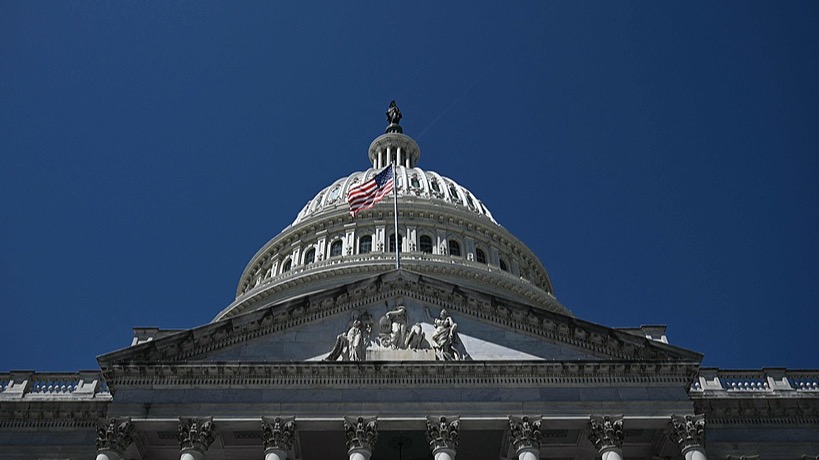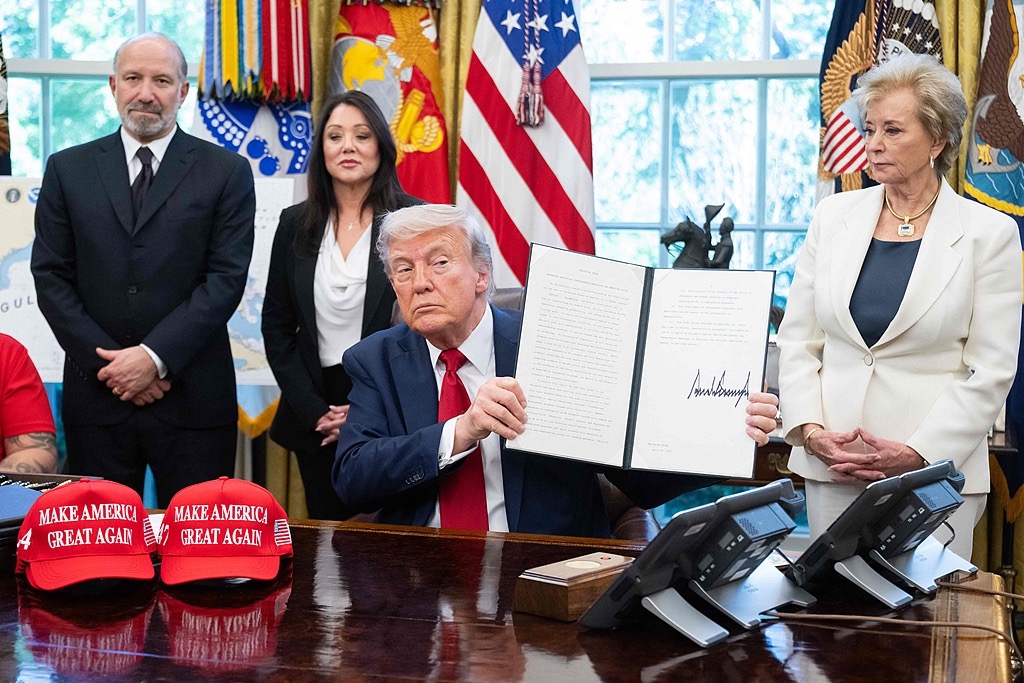Home > > The collapse of American democracy
The collapse of American democracy

An American flag flies at the U.S. Capitol building in Washington, D.C., the United States, April 28, 2025. /CFP
In the 20th century, the United States claimed to be the lodestar of global liberal democracy. Today, that image is fracturing. Behind the facade of familiar institutions lies a deep and accelerating transformation: the dismantling of civilian governance and the rise of a corporate-military regime that governs more through force and profit than through law and consent.
This transformation is not hypothetical. It is operational. And it is being executed with startling efficiency.
Under its current administration, the American executive branch has embarked on an aggressive campaign to hollow out the civilian core of the government. Departments responsible for education, health, diplomacy and welfare have been systematically downsized or stripped of expertise. Programs designed to address inequality, support international development, or protect civil rights are under siege or have been defunded entirely. These cuts are defended under the guise of "efficiency," but they amount to nothing less than a withdrawal of the state from its social contract.
This process is not just administrative; it is ideological. It reflects a belief that the market, not the government, should arbitrate the public interest; that national power is best expressed through military dominance, not diplomacy; and that governance is an arena for private gain rather than public service. This is not small-government conservatism. It is the redirection of the state toward the service of concentrated power.
At the same time, the military apparatus of the U.S. government remains untouched – indeed, it is flourishing. The defense budget continues to swell, even as other departments are drained.The civilian functions of government are being stripped bare, while the military-industrial complex keeps expanding.
The scale of this asymmetry is profound. In the name of national security, funds are poured into next-generation missile systems, cyber warfare infrastructure, and advanced surveillance technologies. Ambitious projects once deemed too costly or speculative – such as missile defense domes or autonomous weapons programs – are now fast-tracked with little public debate. The allocation of federal resources increasingly reflects a single priority: dominance through deterrence.
This shift is not confined to the Pentagon. Across government, the boundaries between public authority and private industry are dissolving. Once managed by accountable agencies, contracts are now handed to private corporations with minimal oversight. Intelligence, logistics, even military operations themselves are frequently outsourced. The implications are profound: America's public policy is increasingly shaped by entities that answer not to voters but shareholders.
The consequences are already visible. The rule of law is being eroded by executive overreach, selective enforcement and the politicization of the judiciary. Protections once enshrined in the U.S. Constitution – freedom of speech, due process, equal protection – are increasingly subject to interpretation by partisan courts or ignored altogether.
This aggressive centralization of power is coupled with a regressive domestic agenda. Programs serving vulnerable populations – immigrants, the poor, the sick – have been slashed or criminalized. Rights movements that once pushed the United States closer to its democratic ideals are now treated as threats to national unity. The result is a chilling paradox: a government that is both smaller and more authoritarian; less present in the lives of ordinary people, but more coercive when it is.

U.S. President Donald Trump signs executive orders relating to higher education institutions, alongside U.S. Secretary of Commerce Howard Lutnick (L) and U.S. Secretary of Education Linda McMahon (R), in the Oval Office of the White House in Washington, D.C., the United States, April 23, 2025. /CFP
Internationally, this transformation complicates the traditional view of American leadership. A country that long self-proclaimed as an open society now projects instability. Long-standing alliances are strained by unpredictability and unilateralism. Multilateral institutions are weakened by withdrawal or neglect. America's role on the world stage seems no longer guided by the so-called liberal democratic values they once championed, but by strategic dominance and transactional diplomacy.
For the whole world, this transformation poses urgent questions. What does American unpredictability mean for geopolitical stability? How should governments and corporations recalibrate their engagement with a nation increasingly governed by the interests of power, not principle?
The erosion of American democracy is not happening with the crack of tanks or the declaration of martial law. It occurs through budget reallocations, personnel firings, regulatory repeals and executive memos. It is happening through normalization – through the gradual acceptance that the government no longer serves the people, but protects entrenched interests.
We must be clear-eyed about what this means. The United States is not undergoing a temporary political swing. It is undergoing a structural realignment. The elevation of the military-industrial complex above all other institutions is not an aberration – it is now a defining feature of American governance. Civilian voices, expertise and oversight are no longer central. They are optional, disposable.
If this trajectory continues, the world must prepare for an America that is not only less democratic but also more volatile and more dangerous. Its internal politics will grow more extreme, its foreign policy will be more erratic and its commitments will be more conditional. For nations that have long aligned their security, trade and diplomatic strategies around the idea of American stability, this demands a sober reassessment.
Democracy is not self-sustaining. It requires infrastructure, education, trust and restraint. The United States is rapidly dismantling those foundations. What remains is the shell of a republic – intact in form, but hollow in function.
The international community must not avert its eyes. What is unfolding is not a domestic matter. It is a global reckoning. The world's largest military power is being reengineered into a machine of private governance and perpetual conflict. Waiting for a new election or a leadership change will not be enough, as the crisis is deeper than personalities. It is systemic.
(Xu Ying, a special commentator on current affairs for CGTN, is a Beijing-based international affairs commentator.)
CGTN 2025-05-07
-
Xi: China remains ideal destination for global investors
Xi: China remains ideal destination for global investors
-
Xi: Advance building of Belt and Road
Xi: Advance building of Belt and Road
-
China, LAC states launch new cooperation drive
China, LAC states launch new cooperation drive
-
China-CELAC Forum to send unity message
China-CELAC Forum to send unity message